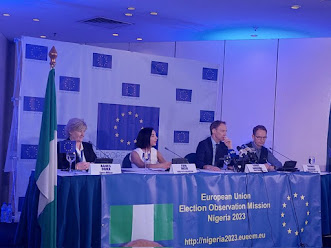Over
95 million eligible voters are scheduled to go to the polls on February 25,
2023 to select one amongst 18 candidates to steer the affairs of Nigeria for the
next 4years. The African Elections Project provides a profile of the leading
candidates contesting the elections.
Let's take a closer look at who the four
candidates are and what they stand for.
Atiku
Abubakar (PDP)
Atiku Abubakar,
76, a former vice president who has fallen short of five previous attempts since
1992, to become the next president of Nigeria, is hoping to have his dream
become a reality on his sixth attempt. Born in Adamawa to a devout Muslim
family, Mr. Abubakar served for two terms as the vice president to former
President Olusegun Obasanjo and was credited with making reforms to key sectors
that helped kickstart economic growth. Mr. Abubakar's campaign is built on his
success as vice president, whereas head of the government's economic team he
oversaw successful reforms in the telecommunications, pension, and banking
sectors that led to jobs and GDP growth.
However,
on many occasions, his critics have accused him of widespread
corruption, saying he’s unfit for the top job in a country where
corruption is a huge problem.
He
is representing the country's main opposition party, the Peoples Democratic
Party (PDP), alongside his running mate, Delta State
Governor Ifeanyi Okowa.
Bola
Tinubu (APC)
Bola Tinubu,
70, a former two-term governor of Lagos State, will lead the ruling All
Progressives Congress (APC) into February's Presidential election. Over the
years, he has been credited with attracting foreign investment and transforming
Nigeria’s public sector
In
the early 1990s, Mr. Tinubu, a southern Muslim who served as a senator faces
various accusations of corruption and has even been linked to allegations
of drug trafficking in the US, all of which he denies.
It
is believed that he will be banking on his experience in politics and huge
influence across the country to win the election, where he will face stiff
competition from former Vice President Atiku Abubakar, who is standing for the
main opposition People's Democratic Party (PDP), and a burgeoning campaign by
the Labour Party's Peter Obi, who is hugely popular with urban voters.
If
Mr. Tinubu, known as "Jagaban" by supporters, gets the top job, he
would be looking to unify a country divided across regional lines, tackle
widespread insecurity, create jobs, and bring down rising inflation.
Kashim
Shettima, former governor of the North-Eastern State of Borno,
is his running mate.
Peter
Obi of the Labour Party (LP)
61-year-old
businessman Peter
Obi
has emerged as a powerhouse ahead of February's Nigerian presidential election,
leveraging social media, particularly Twitter, to send across messages of
prudence and accountability.
In
contrast to what his opponents claim, Mr. Obi, the former governor of the
south-eastern Anambra state, presents himself as "Mr. Clean." They
contend that Mr. Obi is a political impostor, one of many who emerge during
election seasons with illusions of becoming a third
force that will unseat the traditional parties.
He
was the Vice-Presidential Candidate of the PDP in 2019 alongside Atiku
Abubakar, but last year, he switched to the Labour Party (LP).
His
running mate is Yusuf
Baba-Ahmed, a former senator from Kaduna State.
Rabiu
Musa Kwankwaso of the New Nigeria People’s Party (NNPP)
Rabiu Musa Kwankwaso,
66, is a former defense minister and former senator who served two terms as
governor of Kano, one of Nigeria's most populous states. Mr. Kwankwaso is
hoping to be Nigeria's next president on the ticket of the New Nigeria People’s
Party.
Mr.
Kwankwaso, known for his trademark red cap, has previously been in both of
Nigeria's biggest parties—the PDP and APC—before joining the New Nigeria Peoples Party (NNPP)
last year.
Although
analysts say he has little chance of winning the election outright, given that
his power base is largely in the north, they believe he could cause a serious
political upset by taking northern votes from Bola Tinubu of the APC and Atiku
Abubakar, the PDP's contender.
Unsuccessful
with his previous two attempts, this will be the third time Mr. Kwankwaso is
seeking the country's highest office.
His
running mate is Odiri
Idahosa.
The
Other Candidates
The
other Presidential Candidates contesting in this year’s election are: only
female presidential candidate, Ojei Chichi of the Allied People's Movement
(APM), Kola Abiola representing the People's Redemption Party , Adebayo
Adewole of the Social Democratic Party
(SDP), Malik Ado-Ibrahim of the Young
Progressives Party (YPP), Okwudili Anyajike of
National Rescue Mission (NRM), Christopher Imumolen of the Accord Party (AP), Dumebi Kachikwu of the
African Democratic Congress (ADC), Hamza al-Mustapha of the Action Alliance
(AA), Daniel Nwanyanwu of the Zenith Labour Party (ZLP), Adenuga Oluwafemi of
the Boot Party (BP), Nnadi Osita of the
Action Peoples Party (APP), Omoyele Sowore of the African Action Congress (AAC), Peter
Umeadi of the All Progressives Grand Alliance (APGA), and Sani Yusuf (ADP) Action Democratic Party (ADP).
Whoever
wins the 2023 election among these candidates will have an uphill task at hand
- to turn the fear of economic collapse into good fortunes for the country. So
far, candidates have been framing their campaign messages around issues of
reducing insecurity, the economy, as well as the high level of unemployment in
the country.
AEP
Get
the latest news and updates on elections in Africa by following us on twitter
@africanelection and like our Facebook page: African Elections Project
Facebook.





.png)





